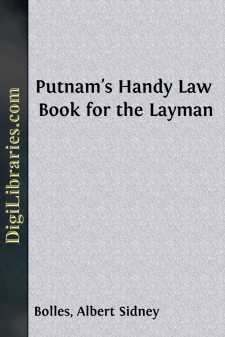Categories
- Antiques & Collectibles 13
- Architecture 36
- Art 48
- Bibles 22
- Biography & Autobiography 813
- Body, Mind & Spirit 142
- Business & Economics 28
- Children's Books 14
- Children's Fiction 11
- Computers 4
- Cooking 94
- Crafts & Hobbies 4
- Drama 346
- Education 46
- Family & Relationships 57
- Fiction 11828
- Games 19
- Gardening 17
- Health & Fitness 34
- History 1377
- House & Home 1
- Humor 147
- Juvenile Fiction 1873
- Juvenile Nonfiction 202
- Language Arts & Disciplines 88
- Law 16
- Literary Collections 686
- Literary Criticism 179
- Mathematics 13
- Medical 41
- Music 40
- Nature 179
- Non-Classifiable 1768
- Performing Arts 7
- Periodicals 1453
- Philosophy 64
- Photography 2
- Poetry 896
- Political Science 203
- Psychology 42
- Reference 154
- Religion 513
- Science 126
- Self-Help 84
- Social Science 81
- Sports & Recreation 34
- Study Aids 3
- Technology & Engineering 59
- Transportation 23
- Travel 463
- True Crime 29
Putnam's Handy Law Book for the Layman
Description:
Excerpt
Explanation of Terms.—At the outset the explanation of a few terms, often used, may be helpful to the reader. Among these are the terms statute and common law. Statute law or statutes mean the laws enacted by the state legislature and by the federal congress. Common law means the decisions made by the state and federal courts. These decisions may relate to the interpretation and application of statutes, or to the application of former decisions or precedents, or to the qualification and application of them, or to the making and application of new rules or principles where none exist that are needed to decide the case in hand.
It is a rule of the most general application that legal decisions are precedents which are to be followed in other cases of the same character. The decisions of the highest court in each state must be followed by the lower courts, but no courts in any state are obliged to follow the decisions of the courts in any other state. The courts in every state must also follow the decisions of the federal courts in all matters of a national character. Thus if a federal court decides the meaning or interpretation of a federal statute, a state court must follow the interpretation in a case requiring the application of that statute.
Again, common law decisions are not binding on the courts that make them like statutes or legislative commands. A decision may be modified or set aside when it is regarded as no longer applicable to the present condition of things. It may also be set aside or changed by legislative action. The common law is therefore always slowly changing like the ocean and is never at rest.
The common law forms much the largest part of the great body of law under which we live. This book is a collection chiefly of common law principles; a few statutes are interwoven here and there to complete the subjects presented.
The distinction also between civil and criminal law requires explanation. Nearly all criminal law is founded on statutes, in other words the statutes, state and federal, define nearly all legal crimes known to society. It is therefore true that the field of crime is not fixed, is in truth always changing. Thus formerly if a man bought goods on credit of another on the statement that he was worth fifty thousand dollars and the seller afterward learned that he was not worth fifty cents, the seller could sue the buyer to recover the value of the goods and for any additional loss, but could do no more. Many, perhaps all the states, now declare by statute that such an act is a crime, and the offender can be prosecuted by the state and fined or imprisoned or both. And the wrongdoer may still be sued in a civil action for the loss to the seller as before.
All crimes are prosecuted by the officers of the state chosen or appointed for that purpose. Again, as in the case mentioned, the wrongful act has a double aspect. An individual who has been wronged may proceed against the wrongdoer to recover his loss; the state also has been wronged and may also proceed against him. A good illustration is a bank defaulter. The bank may proceed through a court of law to recover the money lost by him, or from those who have promised to make the bank good should he wrongfully take anything; the state may also proceed against him as a criminal for breaking a statute that forbids him from doing such a thing. Furthermore, should the bank, as often happens, agree to accept a sum from the defaulter and not trouble him further, the agreement would be no bar to an action by the state against him.
The terms law and equity are frequently used in the law books and require explanation....


